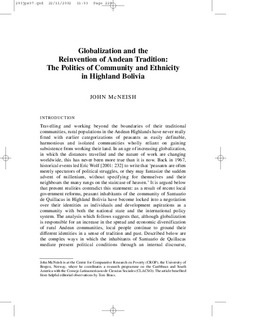Globalisation and the Reinvention of Andean Tradition: The Politics of Community and Ethnicity in Highland Bolivia
Journal article, Peer reviewed
Permanent lenke
http://hdl.handle.net/11250/2474785Utgivelsesdato
2002-01-01Metadata
Vis full innførselSamlinger
- Publications [1488]
Originalversjon
in Journal of Peasant Studies vol. 29 no. 3/4 10.1080/0306615041233131107910.1080/03066150412331311079
Sammendrag
Travelling and working beyond the boundaries of their traditional communities, rural populations in the Andean Highlands have never really fitted with earlier categorizations of peasants as easily definable, harmonious and isolated communities wholly reliant on gaining subsistence from working their land. In an age of increasing globalization, in which the distances travelled and the nature of work are changing worldwide, this has never been more true than it is now. Back in 1967, historical events led Eric Wolf [2001: 232] to write that ‘peasants are often merely spectators of political struggles, or they may fantasize the sudden advent of millenium, without specifying for themselves and their neighbours the many rungs on the staircase of heaven.' It is argued below that present realities contradict this statement: as a result of recent local government reforms, peasant inhabitants of the community of Santuario de Quillacas in Highland Bolivia have become locked into a negotiation over their identities as individuals and development aspirations as a community with both the national state and the international policy system. The analysis which follows suggests that, although globalization is responsible for an increase in the spread and economic diversification of rural Andean communities, local people continue to ground their different identities in a sense of tradition and past. Described below are the complex ways in which the inhabitants of Santuario de Quillacas mediate present political conditions through an internal discourse, involving conflicting interpretations of personal and historical memories. Of particular significance, and the central focus of the article, is the way in which an apparently arcane dispute over municipal status and boundaries is used by local people as a means to understand and devise contrasting strategies for dealing with the new economic and political interests created by government reform.
Serie
Journal of Peasant Studies vol. 29 no. 3/4Journal of Peasant Studies vol. 29 no. 3/4
